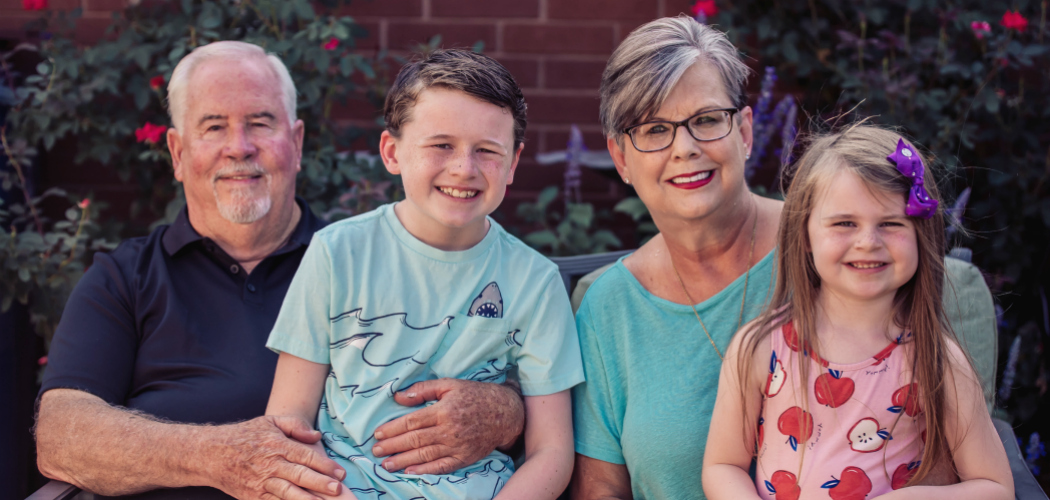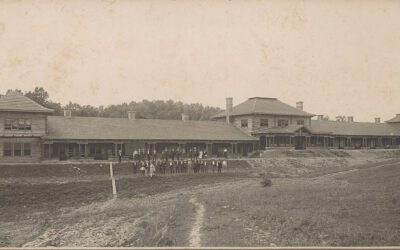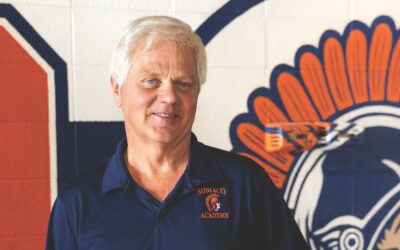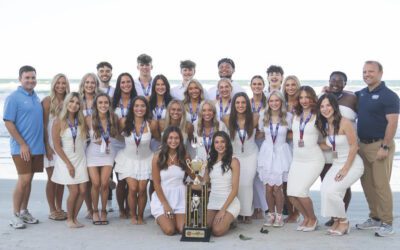[title subtitle=”WORDS Dwain Hebda
IMAGES courtesy AB Lewis Photography”][/title]
There was never a time growing up that Julie Conley and Mary Jane Cobb had reason to feel alone.
Filling two of the youngest three slots in a family of eight children—four boys and four girls—the Texas-born sisters were always in tow with siblings. Even today, in the sixth decade of life, there’s still a protective tone that creeps into Julie’s voice as she talks about her sibling.
“Mary Jane and I have always been close. Really close,” Julie says brightly. “She’s my baby sister and the baby of the family.”
Distance, marriages, changing jobs and growing children did nothing to dilute the bond between the two sisters, despite Julie winding up in Arkansas and Mary Jane in Norman, Oklahoma. Even the darkest event of their lives, ovarian cancer, found a connection there, binding them closer together.
“When Mary Jane was diagnosed, I was going up and staying with her at the hospital in the ICU,” Julie says. “Me and my sister-in-law and my other sister from Florida came down and we were all taking turns.
“I would go up there on Thursday, stay up there during the weekend, and I was just dead tired. I thought, ‘Oh, I’m just being a hypochondriac.’ Then I was having this really bad pain in my side. Sometimes it hurt so bad, I couldn’t even breathe.”
Julie had been experiencing health issues on and off for about a year prior to that, but nothing debilitating enough to warrant anything more than her doctor dismissing it as menopause. But after one particularly uncomfortable trip to see Mary Jane, she couldn’t take it anymore.
“The day I went to have my scan, they called me within fifteen minutes of when I got back home and said, ‘You need to get back in. We need to talk about your scan,’” she says. “They’d found this huge mass in my pelvic area. The woman said, ‘I don’t know if it’s malignant or not, but we’ve got to get it checked out.’”
Through a series of referrals, Julie wound up seeing Dr. Joseph Ivy of Highlands Oncology Group in Fayetteville. Ivy said based on family history and, strangely enough, due to Mary Jane’s diagnosis, the odds of the mass being cancerous were almost zero.
“He said it would be very unusual for both of us to develop cancer with no genetics in our family, but that we needed to remove [the mass]. I said, ‘Sure,’” says Julie. The next day she underwent surgery, after which she once again met with Dr. Ivy.
“He said, ‘Well, I can’t believe it. You’ve got Stage Three 2A ovarian cancer,’” she says. “The mass wasn’t cancer, but my ovaries had cancer in them. They took and did a biopsy and one of them came back positive.”
Julie started her treatment August 13, 2018, a series of weekly chemotherapy sessions that stretched into the week before Christmas, not counting the one week she was allowed to skip because she was so sick she passed out in the chemo center. Such is the nature of a disease that’s so nasty it requires medicine even nastier to kill it.
“The chemo was really rough, and you really have all kinds of emotions going through you at the time,” she says. “I got through with my family and through faith in God; if it hadn’t been for my faith and praying and all, I don’t know. I wouldn’t have made it.”
There were other side effects too, ones that she came to terms with through the help of a caring circle of family and friends.
“They told me I’d be losing my hair and at the end of week two, my hair just started falling out. I hadn’t even started my third treatment,” she says. “After Labor Day, my daughter had me a cancer party and they had little cookies made and everything and everyone brought food. I had about thirty ladies there and she had someone come and they shaved my head.
“That was very emotional because I had real big hair and all and I had to shave it all off. But I wouldn’t recommend anyone keeping it, because it just sheds so much all over the place when it starts falling out. I would go outside and just shake my head and my hair would just go flying.”
Julie found she had other supporters in the community too, folks she would have never known existed had she not developed cancer, but who became an important part of her support system.
“On Facebook, I had talked to various people and asked them if they knew anything about ovarian cancer. I was referred to River Valley Ovarian Cancer Alliance, here in Fort Smith,” she says. “The organization provided a great deal of help to me during my whole treatment.
“They sent me cards all the time, they brought me a care bag and a chemo bag, which had all kinds of things in it for your chemo treatments to take with you. I found out they have meetings once a month and just being a part of that and knowing that you’re able to help and support others is very satisfying.”
Blanche West, who founded the alliance, says the mission of the organization was to raise awareness about ovarian cancer, provide education and serve women in their cancer battle, ranging from providing gas cards and certain kinds of emergency funding to moral support.
“It has been an exciting adventure. It’s been bittersweet at times. I have met some wonderful people that I never would’ve met if it wasn’t for this awful cancer,” Blanche says. “We always feel so honored to be able to help somebody. We help each other and we check on each other and we find out where you are, what you need as a patient and how we can help.”
Julie’s circle has also helped her celebrate the fact that since getting off chemo in December, she’s shown no sign of the disease. And, her group has helped her deal with her grief and misplaced guilt over having come through her fight in better shape than Mary Jane, whom she was always there to protect.
“I’ve had a guilt trip. There’s a guilt there that I’m doing so well and she’s still struggling, because she’s gone through so much,” Julie says. “Mary Jane felt really bad when I was diagnosed. But my sister saved my life; I caught mine at Stage Three and my surgeon said if I had waited another three months, I’d have been where she’s at, at Stage Four. I caught mine earlier because of her and her symptoms.”
As she continues to recover, Julie has turned her focus back toward Oklahoma, rooting on Mary Jane as only a big sister can. When she meets fellow ovarian cancer patients, she thinks of her baby sister and having learned a few things on this road, gives them the shoulder they need as others have done for her.
“Never give up. Stay strong. Rely on your family and friends for support. Always keep your faith with God, and pray,” goes her recipe, which she shares with anyone who needs to hear it.
“Life is precious, and you cannot take anything for granted. Life can change in a flash so love and live life, every minute.”
Learn more about the River Valley Ovarian Cancer Alliance and how you can help at rivervalleyoca.com.




